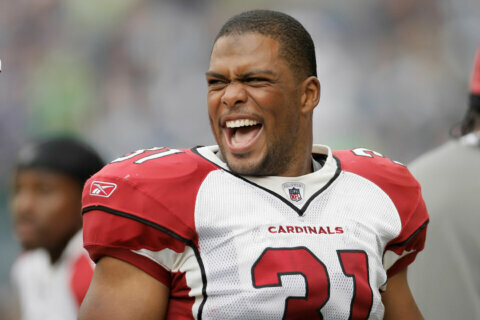Dynamic. Charismatic. Natural leader. Special.
These are just a few of the superlatives frequently used to describe Jason Wright, who on Monday, officially began his historic journey as president of the Washington Football Team.
The 38-year-old former NFL player and business whiz is the NFL’s first Black team president and, currently, its youngest. This made him arguably the most interviewed man in America last week in the wake of the surprise announcement of his groundbreaking hiring.
Wright has been a leader and has enjoyed success everywhere he’s been, but the magnitude of Washington’s organizational issues are staggering. It will take someone truly exceptional to reverse two decades worth of dysfunction.
By many accounts, Wright is the perfect man for the job.
Who is Jason Wright?
It’s well-known that Wright played seven NFL seasons for four teams, walked away from a multimillion-dollar contract offer to get his MBA in operations and finance from a top business school (University of Chicago Booth School of Business) and rose to partner at McKinsey and Company in D.C.
While impressive, this doesn’t scratch the surface of who he is.
Wright was born and raised near Los Angeles in a hardworking family. He said his mother was a flight attendant and his father was a civil rights activist who started his own business as an insurance salesperson and coached Jason’s games as a child.
Wright said his parents not only instilled in him a great work ethic, but “made me a nerd on purpose” — which is to say, he is well-rounded and intellectually curious, with “a quirky set of interests.”
In fact, Wright said he was wearing “Star Wars” socks during our interview and is a huge fan of the franchise.
“I know canon, I know expanded universe, I know more elvish words than I care to admit in the ‘Lord of the Rings’ universe. Pretty deep into ‘X-Men,’ that was my comic book set growing up,” he said.
Wright is also fascinated by languages; he speaks fluent French and said he hopes to learn more.
Beyond his personal interests, Wright is renowned for his generosity. When his wife of 12 years, Tiffany, worked as a teacher at a nonprofit after-school program in Cleveland over a decade ago, the couple took in two struggling teenagers and made them a part of their family.
Those young women are now in their mid-20s and “doing incredibly well,” Wright said. Each has a son, making Wright and his wife grandparents at an extraordinarily young age.
“When I tell that, I’m always like, ‘This is so weird,’ but then I think about how our families were. It’s like the natural evolution of how both of us were raised: to see ourselves as part of a bigger community,” he said.
“We had a really broad definition of family because my parents really saw themselves as stewards of a bigger community, especially with people of color, frankly, as a sense of solidarity of background and shared struggle that opened our household.”
Wright wouldn’t fully delve into the specifics of his charitable endeavors, but he said he and his family, which now includes biological children ages 9 and 6, seek to make the world a better place.
“I think we see ourselves as sort of national and global citizens, and we think about issues that cut across demographics,” he said. “We’re pretty apolitical, so things that cut across political lines and that are pretty inarguably good for society [is what we give to].”
‘I need this guy in my life’
Mike McCartney, an agent at Priority Sports who has spent his life working in and around college and pro football, represented Wright during his playing career and still considers him a friend. The smile on McCartney’s face throughout the interview said far more than his proclamation that he loves talking about Wright.
“He’s fun, he includes everybody, he’s got a gregarious laugh, he’s confident, he’s just a joy to be around,” McCartney said.
McCartney, the son of former Colorado coach Bill McCartney, met Wright when he was a senior at Northwestern speaking on behalf of his team at a Big 10 press luncheon. McCartney said that chance meeting left him “mesmerized.”
“I was blown away at his ability to articulate,” he said. “I just remember thinking, ‘I need this guy in my life.'”
He added: “This is why I became an agent; I want people like Jason Wright in my life.”
McCartney recalled a time when he and Wright were walking in Chicago, deep in conversation. As they approached a homeless man, Wright stopped mid-sentence to give the man money.
When a former teammate of Wright’s couldn’t rent a car, McCartney said, Wright lent the teammate enough money to get a rental car for a week.
McCartney said he’s never seen Wright get mad, which he joked is rare given “he was cut a lot” as a player. McCartney constantly uses the word “special” to describe Wright, who was named a team captain shortly after signing with the Arizona Cardinals in 2009 — a rare distinction for a new backup role player on a team only months removed from a Super Bowl appearance.
“I’ve been in the NFL 29 years and he’s arguably the most impressive person — player, coach, scout, general manager, president — that I’ve ever been around,” McCartney said.
The NFL’s first Black president
Wright squirms a bit when he hears himself labeled the first Black team president in NFL history.
“At first I sort of tried to get out from under the magnitude of that,” he said. “You got to kind of be feeling yourself some kind of way to accept a moniker like that, and that’s just not me.”
While he said “it’s important to pause and celebrate it,” he’s also quick to give credit to Big Ten commissioner Kevin Warren, who was chief operating officer of the Minnesota Vikings and had the duties of a team president without the exact title before becoming the first Black commissioner of a major American student-sports conference.
Still, it’s taken the NFL a full century to give a Black executive this prestigious title.
“There are plenty of other places in our world where there is still a ‘never’ in that category,” he said. “If anything, it should just remind everybody that progress is quite recent and quite early, on many different topics.”
Wright also acknowledges the Black leadership under which he played his seven-year NFL career, most notably former Arizona Cardinals general manager Rod Graves and former Cleveland Browns head coach Romeo Crennel.
Like those men, Wright understands he’s blazing a trail for those who seek to follow in his footsteps. But, he won’t let that pressure affect him.
“It could, but I’ve chosen to not allow it to,” he said. “If I weren’t Black, I wouldn’t feel that pressure so I’m going to choose to be unencumbered by that and take as much as I can the same advantage as somebody else.”
He added, “I have a pretty high bar for myself anyway, so I’m not sure that the historical nature of the moment is going to push me much harder than I push myself already.”
Wright said he hopes to create more pathways for qualified people of color and help them ascend to important administrative roles.
“If you asked anybody at Northwestern that was around Jason Wright, there’s no one that’s going to be surprised that at age 38 he’s in a position like this,” McCartney said, adding that some people on a recent text exchange with mutual friends joked that they thought Wright would be president of the United States by now.
The Snyder contrast
Washington owner Dan Snyder’s reputation is as soiled as Wright’s is sterling, raising questions over the true impact of the hire and whether Wright can thrive where so many others associated with Snyder failed.
McCartney, who spent three seasons trying to negotiate a long-term contract between Washington and its former quarterback Kirk Cousins, said he warned Wright of some of the risks of aligning with the organization.
“There’s a history with a lot of negatives … I wanted him prepared,” he said, adding that he holds no animosity toward Snyder or the franchise.
“Jason had a great job, so it wasn’t like he had to have this. I think a lot of times in an interview, people put their best [foot] forward trying to get the job, I just don’t think that’s how Jason did it. Instead, he probed and asked the tough questions that make people uncomfortable,” McCartney said.
Wright said he and his wife met with Snyder and his wife, and feels confident there will be good collaboration between him and ownership.
“Our early conversations with him and Tanya were rooted in values and all those words I’ve been using — transparency, inclusion, accountability, all of that — and I believed it because of the actions they’ve taken,” Wright said, citing the steps Snyder has taken in the wake of the sexual harassment allegations last month.
Wright knows the franchise’s history and remains confident he can be the agent of change it needs.
“I know I have been afforded the ability,” he said. “I’ve been able to make some business decisions this week that are fully mine. And when Dan heard about them, he didn’t have a peep … he’s trusting his chief executive on the business side to do this thing.”
Added Wright, “Now, will I get the time? I don’t know, we’ll see. I hope so. And the only reason I should get the time is if we start to make steady progress at the pace that makes sense and that’s right for the organization.”
Changing the culture
McCartney said he’s worked closely with Wright and new Washington coach Ron Rivera over the years, and strongly believes the two will work together well.
“I don’t think Dan Snyder could have found two better people to run both sides of the building, and to know that they both have great character, they’re both people persons … the culture there is going to take on a seismic shift,” he said.
“From his mouth to God’s ears,” Wright said with a laugh. “Mike’s faith in me has always been large. He took a chance on me as a player. … There aren’t a bunch of agents clamoring for a running back that runs a 4.6 [40-yard dash].”
McCartney said though Rivera could occasionally draw from Wright’s experience as a player, he expects the two men to stay in their respective lanes.
“Jason is too smart to overstep his boundary,” McCartney said. “That’s not who he is. He’s not on a power trip.”
Besides, Wright has plenty on his own plate. His plan for his first 100 days — which he said is “not that damn interesting” — is broken down into three categories: listen, learn and manage what’s urgent, including the franchise’s approach to trying to play football during the coronavirus pandemic.
“I think we’re in a good spot on COVID,” he said. “But I expect things will shift. Once we start traveling, I don’t know what it’s going to look like.”
At home, the stands will be empty at FedEx Field, which many have joked is typically the case anyway. While Wright doesn’t have a plan to win back fans who gave up on the franchise, he is working to engage fans in a way that allows them to feel like the team hears them.
“This fan base is on another level,” he said. “I’m grateful that people are engaged but I think I’ve come into contact with just how much hurt there is in parts of the fan base, how much disenchantment there is, and while there are great pockets of excitement in thinking about the future, we need to understand where we are collectively as a Washington football family.
“I think the only way we find out the answer to that question is by meeting with people and listening a ton, probably more than we have in the past,” Wright said. “As you think about repairing any relationship, it’s about time and quality time. We probably need more interface with fans. And then we need it done in a way whereas fans have substantive input on what we’re doing.”
A big part of that is the team’s shift from its retired 87-year-old moniker to what Wright has coined as “more than a name, more than a logo — identity.”
“It’s not just about fan excitement, it’s also about the fan base being unified and feeling like they have a shared identity like they did in the past when things were at their peak,” he said.
Wright added that he wants to manage the culture change, especially the response to the sexual harassment investigation. He said it is his mission to ensure the organization provides a professional, safe environment for employees.
Throughout his life, Wright has achieved quite a bit in a relatively short period of time, which in addition to his dedication to doing what’s right, makes McCartney confident Washington’s fortunes can turn around quickly.
“It may not show up in wins and losses Day One, but I think that team is going to be a destination city now,” McCartney said. “I think the word is going to get out among the players quickly that the Washington Football Team … is going to treat them well.”







